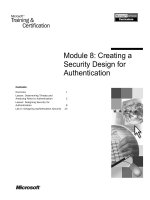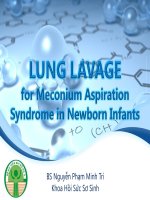22 8 K CC SURFACTANT THERAPY FOR MECONIUM ASPIRATION SYNDROME
Bạn đang xem bản rút gọn của tài liệu. Xem và tải ngay bản đầy đủ của tài liệu tại đây (394.11 KB, 16 trang )
THE EFFICACY OF
SURFACTANT THERAPY
FOR MECONIUM ASPIRATION SYNDROME (MAS)
Dr VO HOAI THUONG
EMERGENCY DEPARTMENT
MAS
What is the role of surfactant in the treatment of
MECONIUM ASPIRATION SYNDROME ?
3 META- ANALYSIS
META-ANALYSIS 1
META-ANALYSIS 1
4 RCTs, 326 infants
4 trials: no difference of mortality
2 trials (n = 208) : The risk of requiring ECMO was
significantly reduced; (RR:0.64, 95% CI 0.46, 0.91); NNT
6 (95% CI 3, 25).
1 trial (n = 40): a statistically significant reduction in the
length of hospital stay [mean difference - 8 days (95% CI
-14, -3 days)].
No statistically significant reductions in any other
outcomes studied
META-ANALYSIS 1
Conclusion:
Reduce the severity of respiratory illness, and the
number of infants requiring support with ECMO
The efficacy of surfactant therapy compared to, or in
conjunction with, other treatment: iNO, surfactant
lavage and HFV remains to be tested
META-ANALYSIS 2
META-ANALYSIS 2
8 RCTs, 512 MAS neonates (257 cases PS/255 cases in the
control group).
Reduced OI(P=0.003)
Shortened hospitalization days (P=0.0001)
Decreased mortality rate (OR=0.47; 95%CI: 0.24, 0.93;
P=0.03) significantly
Increased arterial oxygen/alveolar oxygen ratio (P<0.00001)
No statistical differences in the durations of mechanical
ventilation, oxygen therapy, the incidences of air
leak, pulmonary hemorrhage and ICH
META-ANALYSIS 2
Conclusion:
Currently published evidence from RCTs suggests that PS
replacement therapy is effective for MAS
Further evidence from RCTs is needed to prove the
efficacy
META-ANALYSIS 3
META-ANALYSIS 3
4 RCTs
No difference of mortality by lung lavage
No significant improvements in mortality,
pneumothorax, duration of mechanical ventilation or
duration of hospitalization
UP TODATE
Do not routinely administer surfactant to all patients
with MAS
Administer surfactant to patients with severe disease
Mechanically ventilated and
FiO2 (>0.5) and
High mean airway pressure (>10 to 12 cmH2O)
UP TODATE
The management of MAS is supportive. The following approach is
suggested (Grade 2C):
• Maintenance of adequate oxygenation and ventilation
• Mild or moderate disease: Supplemental oxygen therapy is
usually adequate
• Severe disease: mechanical ventilation, surfactant therapy,
and/or iNO
• Have failed to response to other interventions, ECMO may be a
life-saving intervention
CONCLUSION
Surfactant therapy is efficacious for severe MAS
Decrease mortality rate
Shorten hospitalization days
Reduce the severity of respiratory illness
Further evidence from RCTs is needed to prove the
efficacy
THANKS FOR YOUR ATTENTION









